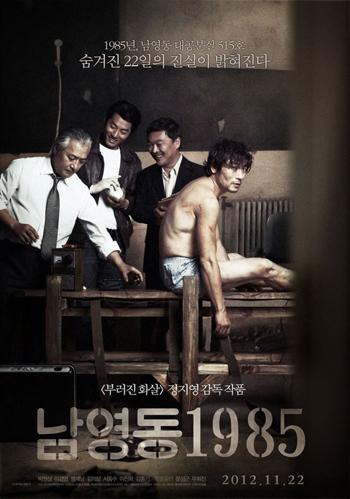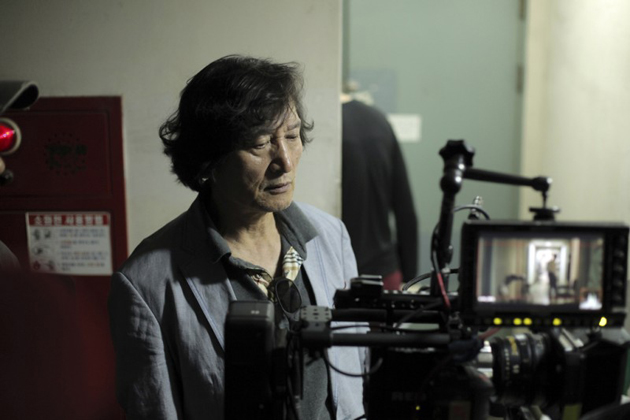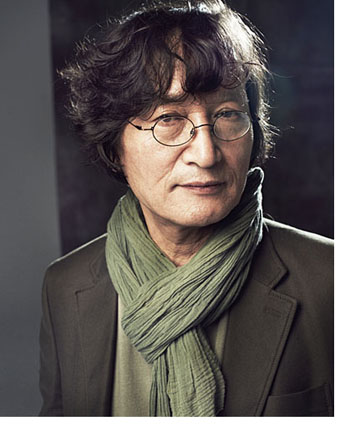Interview with Director Chung Ji-Young, Author of "NATIONAL SECURITY" by Francesco Bollorino
23 settembre, 2013 - 13:08

Anno: 2012
Regista: Chung Ji-Young
How is National Security born?
A novel titled <The Red Cell>, which was published in Korea in 1988, features a main character as a police officer who tortures a citizen. The book’s theme touches exactly on the “banality of evil” in Hannah Arendt’s sense. Being inspired by this novel, my fellow filmmaker attempted to make a film based on this novel but had to give up the film project due to the fierce pressure from the Korean intelligence force (a.k.a. Korean CIA). Since then, I had become interested in the subject but I wanted to use a real person as a main character rather than a fictional figure in <The Red Cell>. Thus, I started to work on a film script dealing with LEE Geun-Ahn who was notorious for his torturing techniques during the dictatorial period in Korea. Time has flied by fast while the script is up in the air as an unfinished one. In the late December, 2011, KIM Geun-Tae, former Congressman and Minister of Health & Welfare, died of Parkinson disease that was caused by severe torture done by LEE Geun-Ahn when Mr. Kim was actively involved in democratic movement in Korea. Knowing this tragic news, I had known Mr. Kim’s personal essay about his experience of being tortured. As soon as I read the book, I put my old work aside and made up my mind to work on a film script to reflect Mr. Kim’s personal experience based on his essay.
I found National Security a masterpiece since it goes beyond the headlines of a historical fact to become a tale on violence and torture, what do you think of my judgment?
First of all, I appreciate your high appraisal of my work as a masterpiece. I agree with your analysis on the film in terms of going beyond the headlines of a historical fact. In particular, I wanted to focus on the brutality of violence to crush human’s body and spirit regardless of being a torturer or a tortured.
The movie depicts many planes of parallel reading in the claustrophobic environment in which the scene takes place: the dignity of the protagonist, the sadism of the torturers, jailers, however, in which there is no unity: it is a boy frustrated, the tired fat man, the official careerist, the torturer cold and relentless, the banality of evil to put it to Arendt ? what do you think?
Well, it will be hard to apply Arendtian sense of banality of evil to this film without exceptions. As you pointed out, various officers in this film do their torturing acts grown form their own psychological complex caused by different personalities and perspectives. However, I am sure that all of them act under the influence of the banality of evil with different degrees.

These characterizations were present in the autobiographical novel, or are the result of your work?
In Mr. Kim’s essay, there was no detailed description about officers. I created characters of officers based on interviews of actual victims when I was in preproduction.
In the end comes the theme of forgiveness denied or impossible
He does not deny but impossible to forgive. The denial of forgiveness is not from his ‘will,’ but from his own ‘trauma.’ This can be explained by the last scene in which he hears the auditory hallucinations of whistle when he leaves the cell room.
It is a civil movie back to an era of Korean recent history certainly not forgotten and I still burn in the conscience. How has it changed since then Korea?
Yes, it is true Korea has been transformed to more democratic country by fast in the recent history. However, unfortunately, we have two Koreas. Unless the history of divided Korea is ended, I believe Korea will continue to suffer fragile democracy. I don’t think I can answer this question in this short memo though.
 Tell me about the Korean movie industry that we are facing more and more and where you work from many years to now. Which is your opinion about its pst and its future? Which are the issues most frequently addressed?
Tell me about the Korean movie industry that we are facing more and more and where you work from many years to now. Which is your opinion about its pst and its future? Which are the issues most frequently addressed?
Since 1998 in the era of President KIM Dae-Jung, the Korean film industry has grown tremendously. The era of political censorship was ended and the freedom of expression has blossomed finally thanks to the KIM Dae-Jung governmental policy. The present Korean film industry has become the rare country in the world to be able to occupy about 50% of the local market against Hollywood domination. However, I’ve realized that the era of political censorship has replaced by the era of capital censorship in these days. Big conglomerates intervene into every aspect of filmmaking processes and the creative freedom has been subordinated to the power of the capital. Facing this humongous power, Korean filmmakers are struggling for their creative rights and working hard collectively.
One last question on your cultural references: who are your teachers? Which movies do you love much? To those who you inspired starting this career?
In the 1960s, I was a teenager who loves literature. As you know, the 60s are known for the era of resistance and subversion such as Angry Yound Man and Beat Generation, etc. The 60s’ Korean film was blossomed with esteemed directors such as KIM Soo-yong, LEE Man-hee, KIM Ki-young, YOO Hyun-mok, SHIN Sang-ok who were in their heyday by dealing with realism in Korea then. Naturally I was influenced by those respectful directors. As I go through from the military dictatorships in the 70s and 80s to political turmoils until now, I have become more interested in how human beings are transformed by social contradictions.








